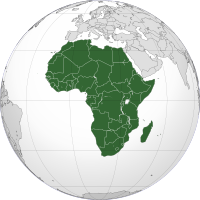
Photo from wikipedia
The low adoption of new technologies, particularly improved seeds, remains a critical issue hampering the development of agriculture in many developing countries. The objective of this research is to identify… Click to show full abstract
The low adoption of new technologies, particularly improved seeds, remains a critical issue hampering the development of agriculture in many developing countries. The objective of this research is to identify the determinants of (i) the farmer’s knowledge,( ii) the adoption decision and (iii) the adoption intensity of NERICA rice varieties in the Togolese Savannah region. Probit and Tobit models were used to analyse data collected from 150 rice growers randomly selected. The results of the estimations showed that the knowledge, the adoption decision and the adoption intensity of NERICA are determined by socio-economic and institutional factors. The common factors affecting the knowledge, the adoption decision and the adoption intensity are credit access, extension service and gender. However, the adoption intensity is specifically affected by the rice income, the land ownership and the membership to a farmer’s base organization. These findings suggest the necessity to improve the agricultural credit access, the extension services access and to take gender into account in policies making in order to give men and women the same chances of access to innovations.
Journal Title: Journal of Economics and Business
Year Published: 2021
Link to full text (if available)
Share on Social Media: Sign Up to like & get
recommendations!